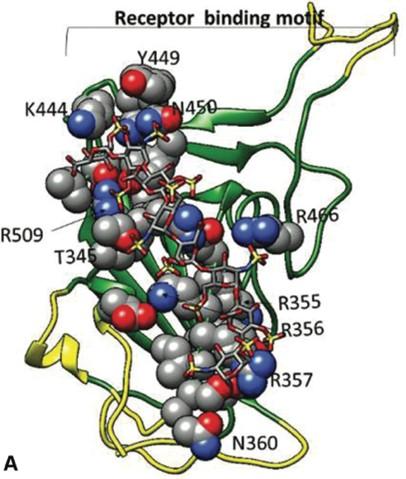Common anticoagulant drug could be repurposed for Covid-19 treatment

Credit: Mycroft-West et al.
An international team of researchers led by the Universities of Liverpool and Keele, working with Public Health England, has found that the common anticoagulant drug heparin inhibits the SARS-Cov2 virus spike protein, by reducing the virus’ ability to attach to human cells and infect them.
The research, published in the journals British Journal of Pharmacology, and Thrombosis and Haemostasis, found that heparin interacts with the spike protein on the surface of coronavirus (SARS-CoV2), destabilising its structure and preventing it from docking with the ACE2 receptor on human cells.
Molecular modelling by collaborators at Queensland University in Australia showed how heparin can stick to the surface of the spike protein to achieve these effects, and studies with live SARS-CoV2 virus carried out at Public Health England’s Porton Down laboratory showed that unfractionated heparin (but not low molecular weight heparins) could inhibit cell infectivity at doses similar to those currently used in clinical settings as an anticoagulant.
Crucially, the data strongly supported the clinical testing of inhaled (“nebulised”) unfractionated heparin, since the doses known to be delivered to the lungs would have very strong anti-viral effects.
Professor Jeremy Turnbull from the Department of Biochemistry and Systems Biology at the University of Liverpool said: “This is exciting news since heparin could be rapidly repurposed to help alleviate Covid-19 infections, or possibly as a prophylactic treatment for high-risk groups such as medical staff or care workers. The results have also led us to investigate other novel compounds which mimic heparin that could potentially be effective against SARS-CoV2.”
Dr Mark Skidmore from the School of Life Sciences at Keele University co-led the research. He said: “We also know that heparins inhibit a range of other viruses, so studying these drugs could provide new therapeutic strategies, and possibly a first-line of defence against emerging viral threats in the future, for example while vaccines are developed.”
Professor Miles Carroll, of the National Infection Service, Public Health England added: “New treatments which target the SARS-CoV2 virus are urgently needed. Heparin, with its well-known clinical safety profile, is certainly an interesting candidate for repurposing against Covid-19.”
“The Covid-19 pandemic has had a significant impact on the delivery of NHS services and local communities. These results strengthen the need for further investigation of heparin as a treatment in Covid-19 patients,” said Dr Quentin Nunes, Consultant at the East Lancashire Hospitals NHS Trust, who is leading efforts to begin clinical trial of nebulised heparin in ITU patients in the UK.
The early release of preprint data from this study in March 2020, now published in peer-reviewed journals, has stimulated international efforts to explore the use of heparins for Covid-19 treatment. Further work is now ongoing to explore the potential of heparin and heparin-mimicking compounds as potential broad-spectrum antiviral drugs for Covid-19 and other emerging viral threats.
###
Media Contact
Nicola Frost
[email protected]
Related Journal Article
http://dx.




